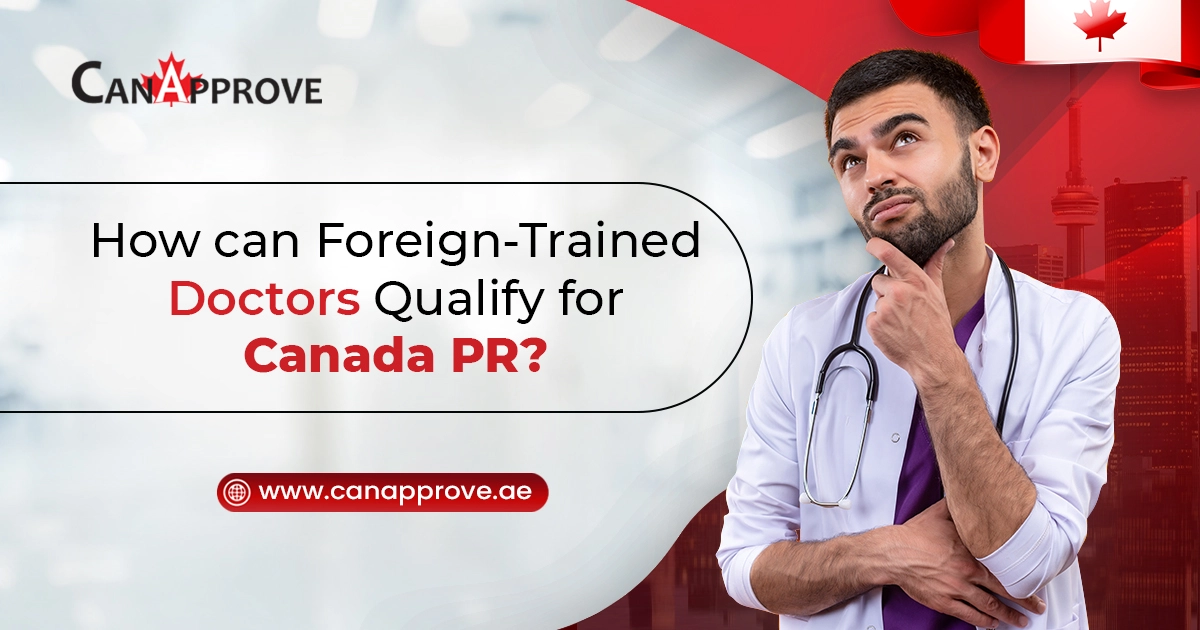Canada is built on the steady intake of skilled immigrants. The country is successful in retaining most immigrants through its permanent residency status and the benefits that come along with it.

The demand for healthcare professionals is booming in Canada. Various surveys have reported huge job vacancies across the healthcare sector for nurses and a rise in demand for physicians/doctors in Canada. If you’re a foreign-trained doctor or nurse, the chances of qualifying for Canada PR are the highest in 2023.
This blog is designed to give you an overview of why and how to immigrate as a doctor in Canada in 2023.
Healthcare Professionals in Canada
One in every four healthcare professionals in Canada is an immigrant. We find that 23% of registered nurses and 36% of physicians in Canada are immigrants.
Other healthcare occupations in Canada also make up a substantial percentage of immigrants:
- 54% of dental technologists and related occupations
- 39% of dentists
- 37% of pharmacists
- 35% of nurse aides and related occupations
The primary requirements for any foreign-trained healthcare professional to work in Canada is to obtain a license as the following occupations are regulated:
- Specialist physicians
- General practitioners and family physicians
- Dentists
- Veterinarians
- Optometrists
- Chiropractors
- Allied primary health practitioners
- Other professional occupations in health diagnosing and treating
- Audiologists and speech-language pathologists
- Physiotherapists
- Occupational therapists
- Other professional occupations in therapy and assessment
Take this free assessment online to determine your eligibility to qualify for Canadian immigration.
Canada is Making Foreign-Trained Doctors Easier to Qualify for Permanent Residency
-
Ontario Plans Foreign-Trained Doctor Credential Recognition Program
The College of Physicians and Surgeons of Ontario (CPSO) will soon announce a three-month program to recognize credentials of foreign-trained physicians who are willing to work and settle in Canada.
Through such a program, the regulatory body would:
- rapidly assess the qualifications of foreign-trained physicians over a 12-week period through supervision and direct observation
- deploy successful candidates to underserviced communities, and
- provide a PR path to independent licensure for these foreign-trained physicians.
Other provinces in Canada use Practice Ready Assessment (PRA) programs to support the licensure of internationally-trained physicians who have already completed their training and practiced abroad.
The available PRA programs are
- Alberta Clinical and Surgical Assistant Program
- Alberta International Medical Graduate Program
- Collège des médecins du Québec – Practice-ready assessment
- Clinical Skills Assessment and Training Program (Newfoundland and Labrador)
- HealthForceOntario Access Centre
- IMG-BC Program
- Medical Licensure Program for International Medical Graduates (Manitoba)
- Saskatchewan International Physician Practice Assessment (SIPPA)
- Touchstone Institute (formerly Centre for the Evaluation of Health Professionals Educated Abroad) (Ontario)
-
Canada Allows Self-Employed Physicians for PR Through Express Entry
Physicians who are already in Canada as temporary residents will now be able to obtain permanent residency through Express Entry programs.
Until now, physicians who practice in Canada could not qualify for Express Entry programs since their nature of work is different from the traditional employee-employer relationship. This means many physicians or doctors who are currently in Canada as temporary residents are considered self-employed.
However, being self-employed with at least one year of work experience abroad does not stop the candidates to apply for permanent residency through the Express Entry program.
-
Canadian Provincial Nomination Programs for Foreign Doctors
Canadian provinces have dedicated programs through which they nominate specific categories of healthcare professionals for immigration. Like, British Columbia, Nova Scotia, and Saskatchewan have such streams.
Usually, a job offer from a Canadian employer or work experience as a healthcare professional is a pre-condition for provincial nomination. Foreign-trained doctors willing to practice in Canada may receive provincial nominations if they have already completed the accreditation process, as discussed below.
Each Canadian province and territory has its Medical Regulatory Authority and requirements. Canadian Medical Regulatory Authorities in the provinces are:
- Collège des médecins du Québec
- College of Physicians and Surgeons of Alberta
- College of Physicians and Surgeons of British Columbia
- College of Physicians and Surgeons of Manitoba
- College of Physicians and Surgeons of New Brunswick
- College of Physicians and Surgeons of Newfoundland & Labrador
- College of Physicians and Surgeons of Nova Scotia
- College of Physicians and Surgeons of Ontario
- College of Physicians and Surgeons of Prince Edward Island
- College of Physicians and Surgeons of Saskatchewan
- Government of Northwest Territories
- Government of Nunavut
- Yukon Medical Council
Steps to Immigrate and Practice as a Doctor in Canada 2023
Step 1: Check whether Canada recognizes your medical degree: Use the World Directory of Medical Schools (WDMS) to begin your search.
Step 2: Open a physiciansapply.ca account: medical credentials verification, registration for assessment exams, and other steps will be managed via that account. Creating a physiciansapply.ca account is mandatory.
Step 3: Submit your medical diploma for source verification to the Medical Council of Canada : You can create an Express Entry profile at this stage to begin working on your immigration plan. Click here to know more.
Step 4: Take the Medical Council of Canada Qualifying Examination (MCCQE) Part I
Step 5: Take the National Assessment Collaboration (NAC) Examination
Step 6: Take the Medical Council of Canada Qualifying Examination (MCCQE) Part II
Step 7: Get Licentiate of the Medical Council of Canada: While LMCC does not authorize to practice medicine in Canada, it will help in the registration with Canadian Medical Regulatory Authority, unique to each province.
Step 8: Take a practice-ready assessment (PRA) program: Foreign doctors who had postgraduate clinical medical training abroad and are looking to get a provisional license to begin independent practice. Details of PRA are already shared.
Step 9: Submit an application to the Registrar of the Canadian Medical Regulatory Authority (MRA): Any foreign-trained doctor can start their practice in Canada only upon licensing from the MRA.
Why Consult with CanApprove?
CanApprove is an immigration and overseas education consultancy for 25+ years and still counting. We are licensed and recognized by the College of Immigration and Citizenship Consultants (CICC) which allows us to offer genuine documentation support for your Canadian immigration. Our direct tie-ups with educational institutions allow easy admissions into Canadian colleges and universities to study medicine & other courses.
Book your free consultation with us to determine your eligibility based on your academic and work experience.












